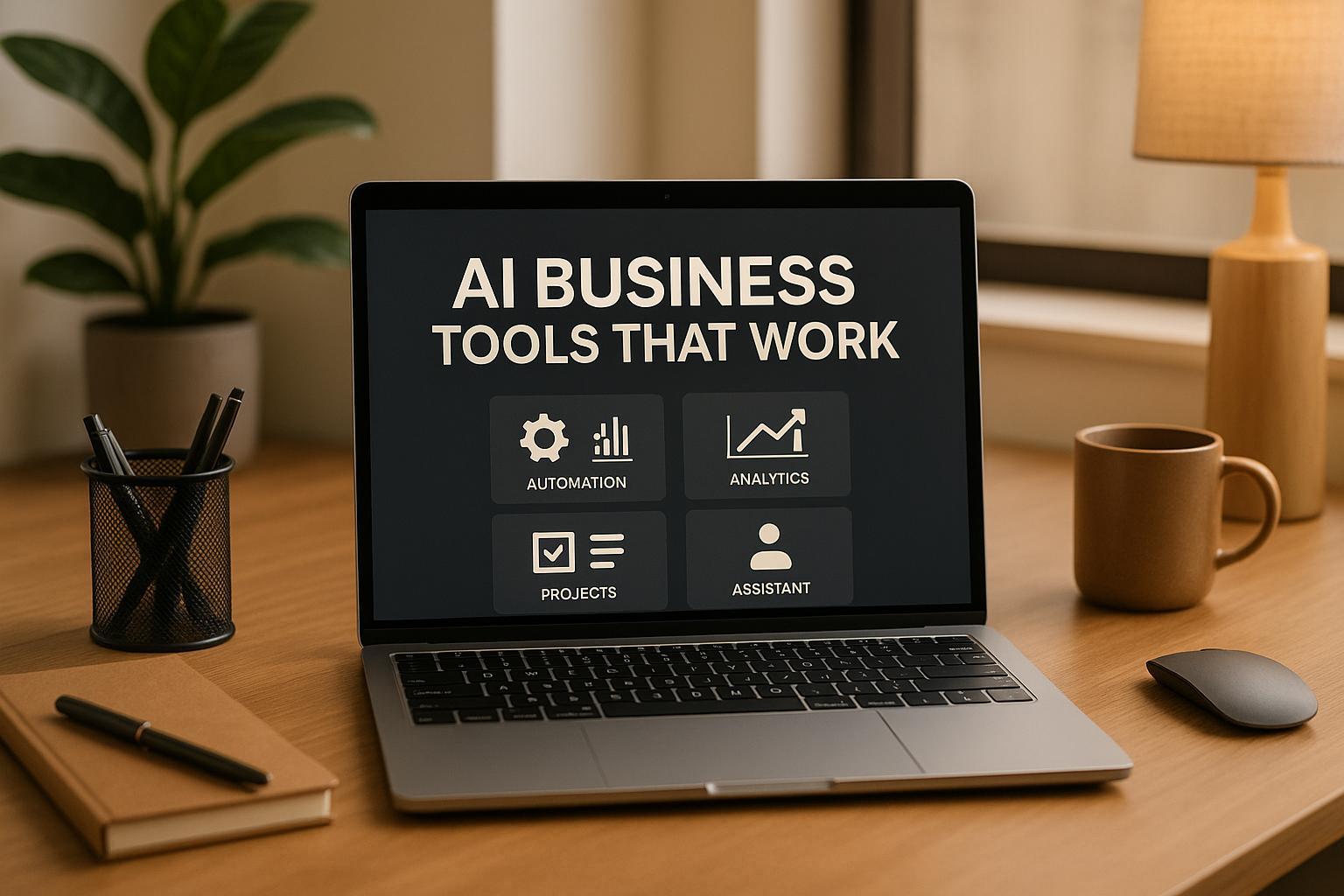
AI tools are transforming businesses by boosting productivity up to 10× and cutting software costs by as much as 98%. But with so many options, choosing the right one can be overwhelming. This article reviews five leading tools - Prompts.ai, monday work management, Make, Zapier AI, and n8n - highlighting their strengths, use cases, and pricing structures. Here's a quick summary:
Each tool serves different needs, from AI orchestration to project management and workflow automation. Whether you're a small business or an enterprise, there's a solution tailored to your goals.
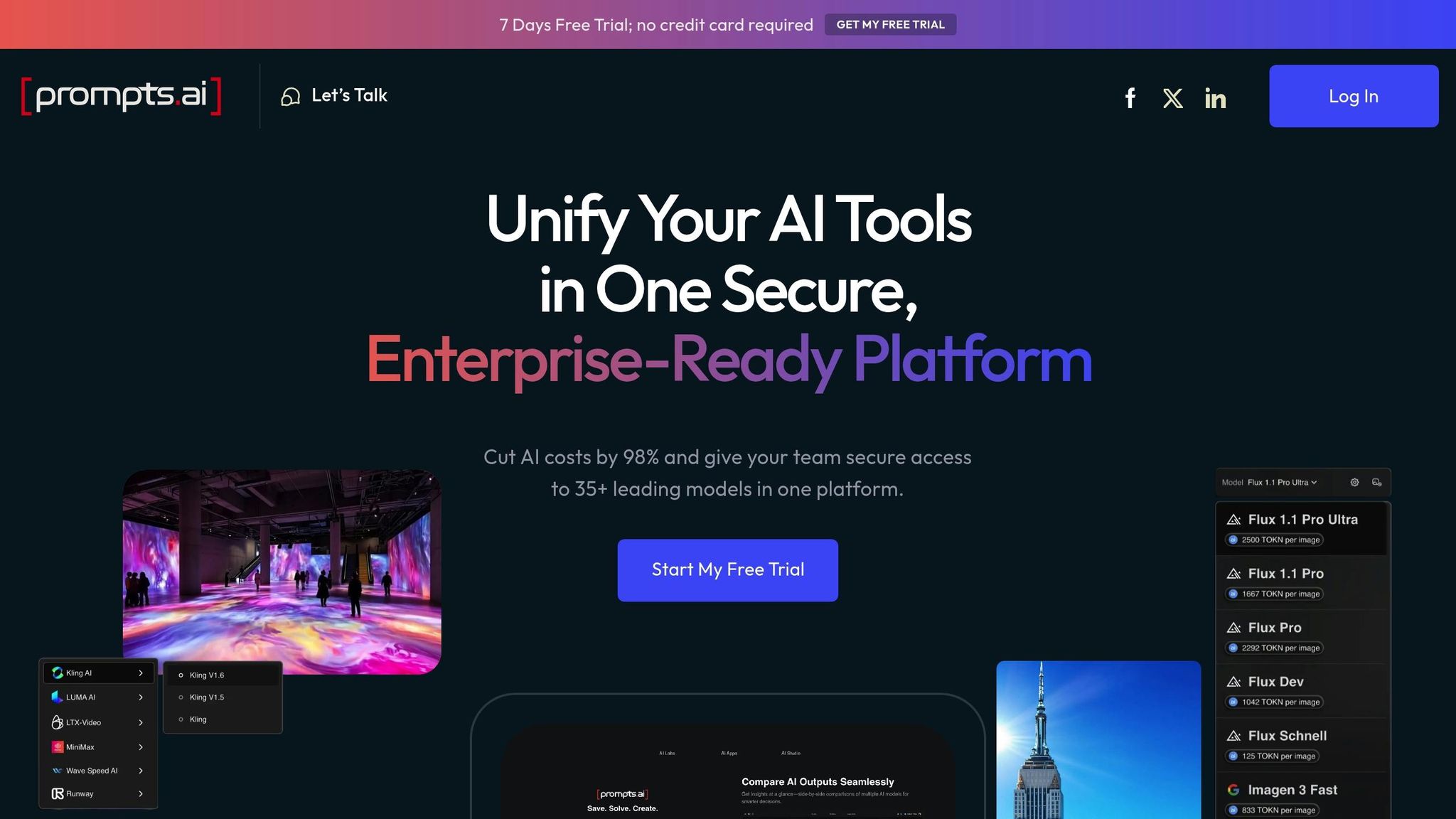
Prompts.ai is an enterprise-level AI orchestration platform designed to simplify and centralize AI usage. By providing access to over 35 top-performing large language models - including GPT-4, Claude, LLaMA, and Gemini - through a single interface, it eliminates the inefficiency of juggling multiple tools.
Unlike typical AI tools that focus on specific functionalities, Prompts.ai emphasizes governance, cost efficiency, and scalability, making it a standout choice for organizations aiming to manage AI usage across teams while ensuring compliance. Its integrated approach combines seamless interoperability, transparent cost management, and effortless scalability.
Prompts.ai consolidates major AI models into one workspace, removing the hassle of switching between platforms. This allows teams to compare models side-by-side, making it easier to identify the best-performing and most economical option for various tasks. With this unified setup, employees no longer need separate accounts for tools like ChatGPT or Claude.
The platform also supports shared prompt workflows, enabling teams to collaborate more effectively. If one department creates a successful prompt template, other teams can easily adapt it, reducing redundancy and ensuring best practices are shared across the organization.
Prompts.ai doesn’t just unify tools; it also provides complete visibility into AI spending. Its FinOps layer, powered by a pay-as-you-go TOKN credit system, offers real-time insights into usage and costs. This approach can cut AI-related expenses by up to 98%, compared to managing individual subscriptions for multiple services.
The platform tracks spending at a granular level - by team, project, and model - helping businesses pinpoint areas where premium models might be unnecessarily driving up costs. Additionally, its audit trails document all AI interactions, a critical feature for regulated industries that require strict compliance and oversight.
Prompts.ai is built to grow with your organization. Whether you're a small creative agency or a Fortune 500 company, the platform’s architecture supports teams of any size. New users can onboard within minutes, and shared templates and workflows ensure they can immediately leverage proven strategies rather than starting from scratch. This reduces the learning curve and accelerates AI adoption across larger teams.
By unifying AI tools and subscriptions into one streamlined interface, Prompts.ai saves time and boosts productivity. Teams no longer waste hours managing multiple platforms, and the platform’s cost optimization features deliver measurable financial benefits.
The Prompt Engineer Certification program further enhances organizational AI expertise by training internal champions who can drive adoption and guide teams. This ensures that AI capabilities don’t remain confined to tech-savvy individuals but are effectively integrated across all departments.
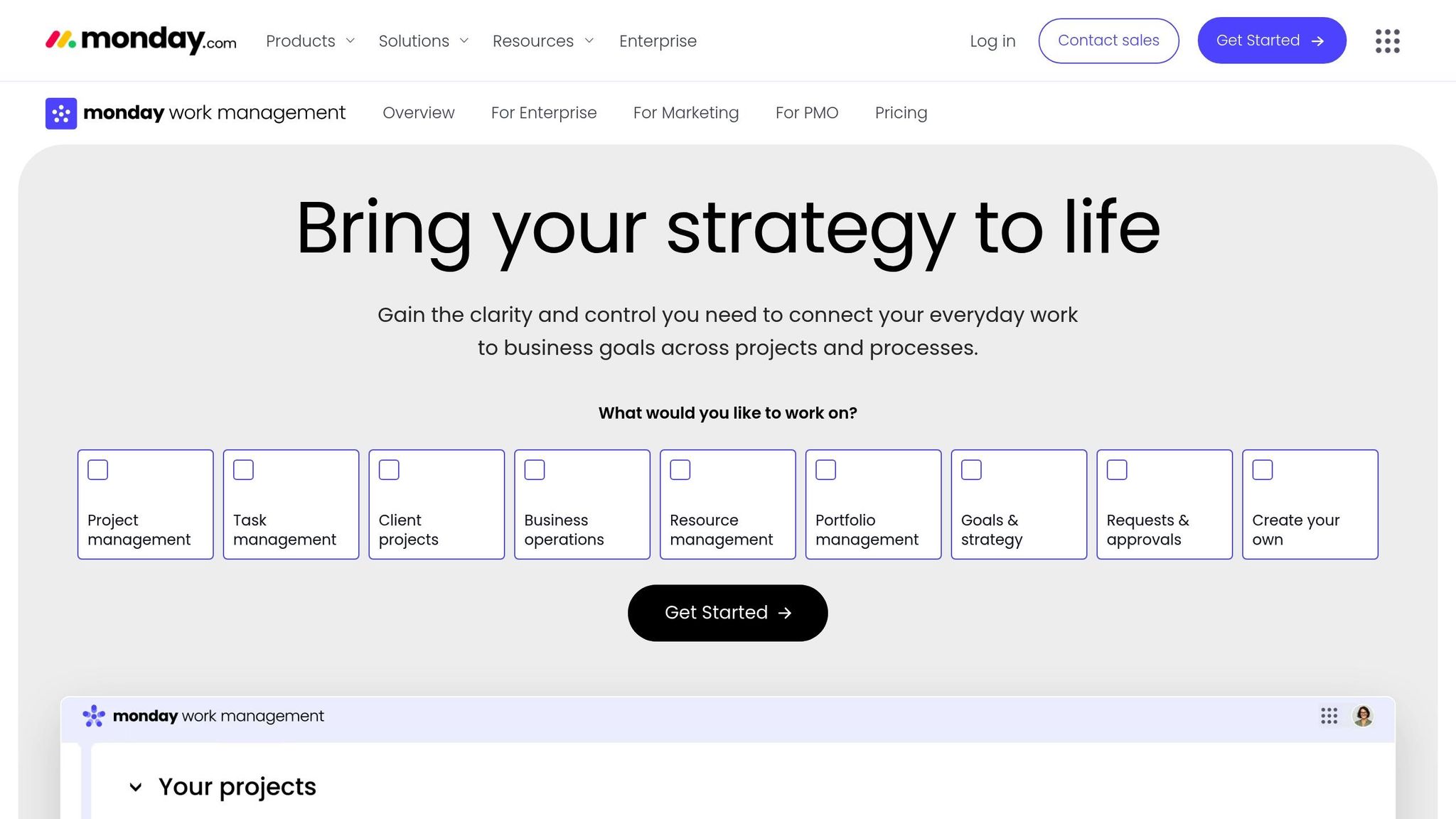
monday.com simplifies project management by embedding AI directly into its platform. This integration automates essential tasks, allowing teams to take advantage of AI without disrupting their current workflows. In this section, we’ll dive into monday.com’s approach, focusing on how it enhances efficiency and collaboration through its AI-powered tools.
The platform includes features like automatic categorization, sentiment analysis, content summarization, and translation - all seamlessly integrated into existing workflows.
One of monday.com’s standout features is its ability to connect with a wide range of tools, enabling smooth collaboration across platforms. With over 200 pre-built integrations - including Slack, Gmail, Microsoft Teams, Excel, Outlook, and DocuSign - teams can eliminate data silos and centralize their work in one place.
What makes monday.com unique is how it incorporates AI into these integrations. Features like categorization, sentiment detection, and translation can be applied directly within connected tools, creating a unified and efficient experience. The platform supports leading AI models, such as Microsoft Azure OpenAI, OpenAI's GPT, and AWS Bedrock models like Mistral and Anthropic, ensuring compatibility with a variety of AI technologies. For tools not natively supported, monday.com offers an open API, allowing teams to build custom connections without needing coding expertise.
"monday has all the functionalities and integrations we need without being unnecessarily complicated." - Naomi M., Head of Client Success
monday.com’s AI infrastructure, powered by its WorkOS platform, is built to grow alongside organizations of any size. Whether you’re a small startup or a large enterprise managing complex projects, the platform adapts to your needs. Additionally, monday.com plans to introduce a suite of AI Assistant apps, enabling teams to gradually adopt AI tools without disrupting their workflows.
monday.com’s design delivers measurable productivity boosts across various industries. By automating repetitive tasks while maintaining visibility into projects, teams can achieve substantial efficiency gains.
"With monday.com's AI capabilities, we've cut manual work by 50% - it saves us so much time and helps us get more done with less effort." - Amit Barami, CEO at Oversight
For example, real estate professionals benefit from its email integrations, with Outlook automatically capturing and tracking tasks from emails. This ensures deadlines aren’t missed and client service is improved. Customer experience teams also leverage integrations with tools like Slack, Google Drive, and Trello to streamline their workflows. The platform’s impact is evident in over 6,000 G2 reviews, where users praise its integrations and AI-driven project management capabilities.
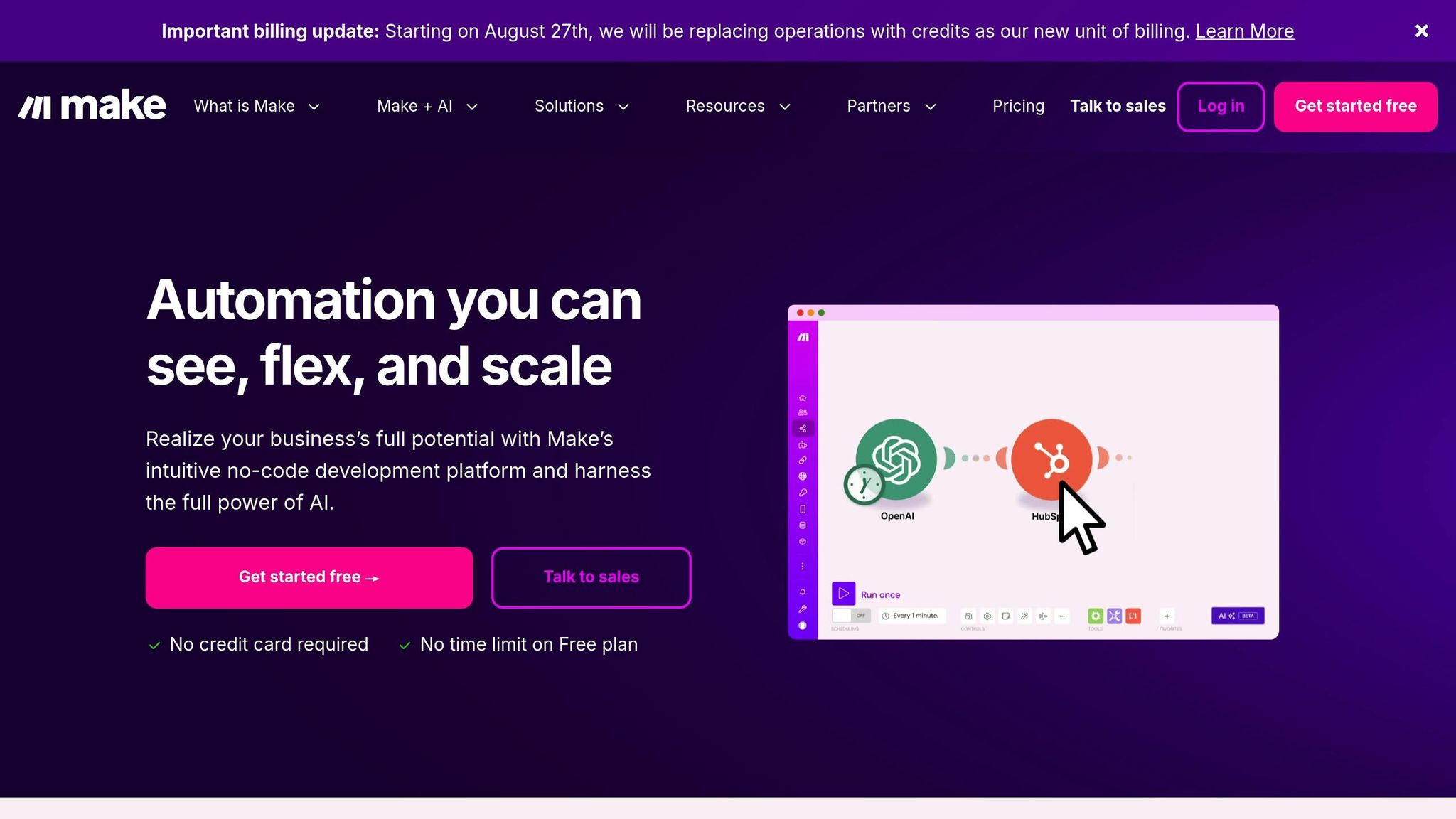
Make offers an intuitive way to automate workflows without the need for coding, giving users clear, real-time insights into how their data flows through various processes.
With support for branching logic and conditional workflows, Make allows businesses to create automation tailored to specific criteria and changing operational requirements.
Below is a closer look at some of Make's standout features.
Make connects seamlessly with a wide selection of business tools, ranging from general productivity apps to specialized industry software. Its visual editor provides a clear view of data flows, making it easier to troubleshoot and fine-tune workflows. The platform also supports real-time data syncing and enables custom integrations through webhooks and API connections.
The platform uses an operations-based pricing model, meaning users pay based on actual usage. This ensures costs are easy to understand and predict.
Make is versatile enough to handle everything from basic two-app connections to intricate enterprise-level workflows. Pre-built scenario templates enable quick setup, while collaboration tools and execution logs help teams refine and improve processes efficiently.
By automating repetitive tasks and simplifying data synchronization, Make cuts down on manual data entry. Its user-friendly visual interface empowers team members at all levels to contribute to process improvements, boosting overall efficiency.
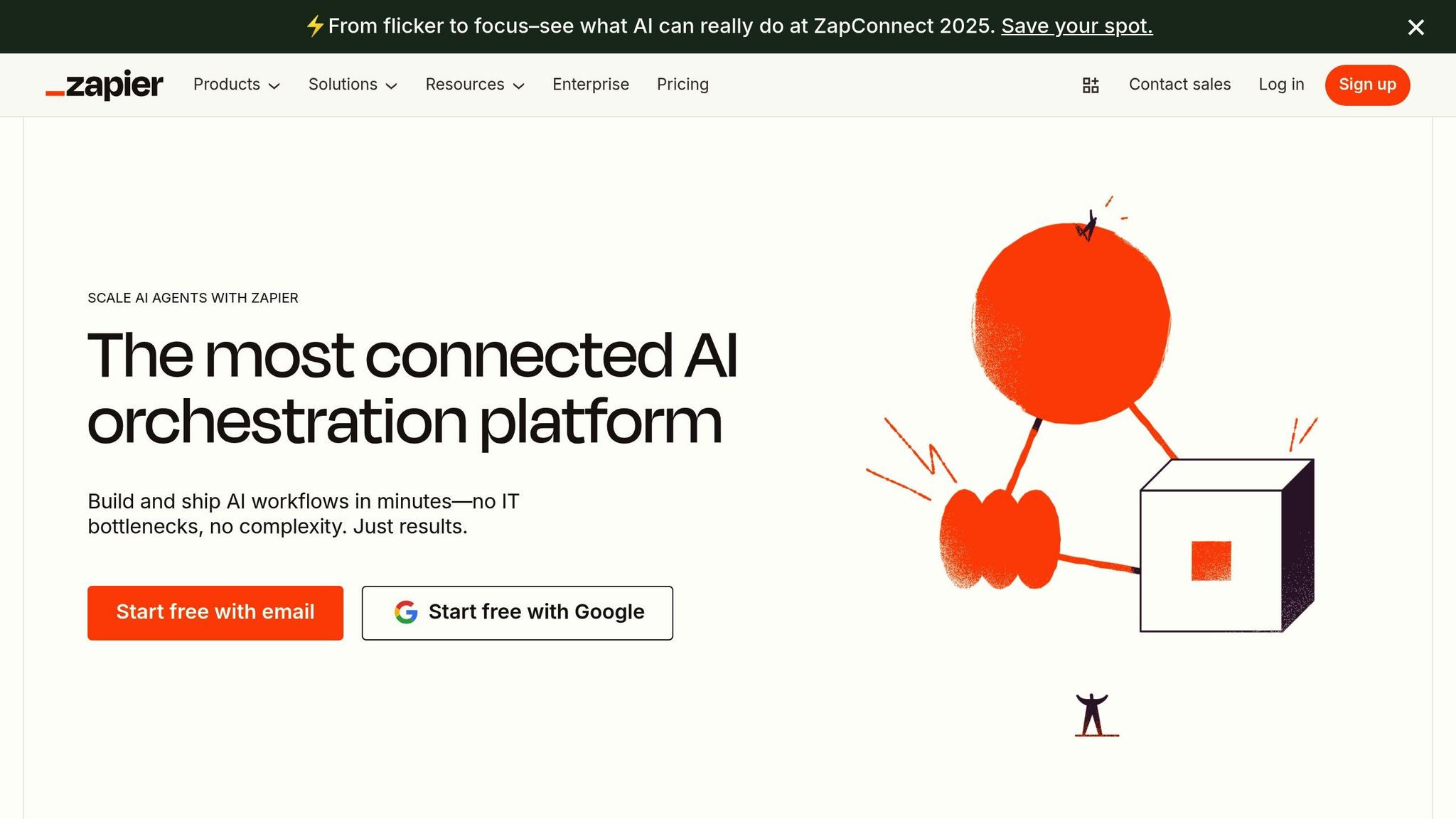
Zapier AI bridges the gap between AI tools and business applications, integrating seamlessly with around 8,000 commonly used apps and SaaS platforms to simplify workflows and optimize automation efforts.
One of the platform's standout features is its ability to connect otherwise disconnected systems through its vast app ecosystem. Teams can design automated workflows that activate AI-driven processes based on specific triggers. For instance, it can analyze customer feedback when a new support ticket is submitted or create content automatically when a project hits a key milestone.
Zapier AI uses a task-based pricing structure, meaning users are charged only for completed automation steps. This model offers businesses clear insight into their expenses, allowing them to scale automation efforts in line with actual usage rather than committing to fixed subscription rates.
Whether you're setting up a simple two-step automation or a more intricate multi-branch workflow, Zapier AI has you covered. Pre-built templates make it easy to get started, while advanced tools like conditional logic and error management ensure that even complex workflows run smoothly and reliably.
By integrating AI capabilities directly into existing processes, Zapier AI removes the need for manual data transfers between systems. It enables teams to automatically move data between tools, initiate AI analyses based on specific conditions, and maintain consistent follow-up actions - all without requiring constant supervision.
This seamless integration not only simplifies automation but also enhances the efficiency of other AI tools, creating smoother operations across various platforms.
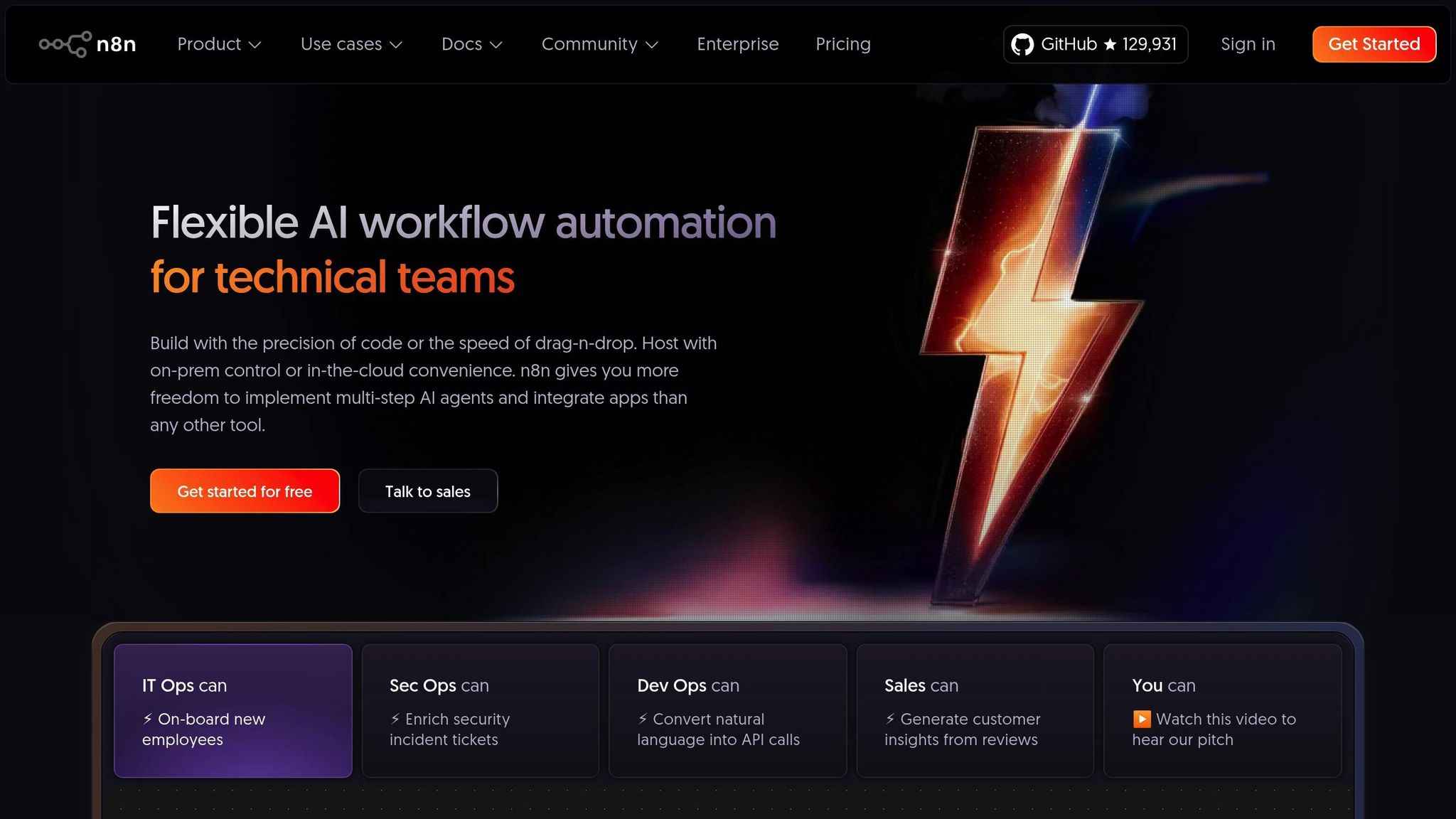
n8n is an open-source platform designed for workflow automation, offering deployment flexibility on-premises or in private cloud environments. This setup provides organizations with tighter control over their data, making it a strong choice for those with strict data governance policies.
To match its adaptable deployment options, n8n incorporates advanced security protocols. Sensitive data, such as API credentials and workflow parameters, is encrypted at rest using AES-256 encryption, ensuring safe storage.
The platform supports various authentication methods, including OAuth2, API keys, and Single Sign-On (SSO) through LDAP and SAML. Multi-Factor Authentication (MFA) and Role-Based Access Control (RBAC) further limit access to workflows, while audit logs track all user actions.
Data in transit is safeguarded by Transport Layer Security (TLS), and network security is reinforced with firewall configurations that restrict access to essential ports. Regular security evaluations, such as penetration testing and vulnerability scans, are also conducted to maintain high standards of protection.
These robust security measures allow n8n to not only optimize workflow automation but also meet the stringent compliance requirements of today’s enterprises.
After examining the features of each tool, let’s dive into their key strengths and drawbacks. Each platform brings something distinct to the table, and understanding these trade-offs helps determine which one aligns best with your organization’s needs, budget, and technical capabilities.
Prompts.ai shines when it comes to cutting costs and offering diverse model options. With access to over 35 top-tier language models, it can reduce AI software expenses by up to 98%. Its enterprise-grade security and unified interface simplify managing multiple AI workflows, eliminating the chaos of juggling too many tools. However, its focus is squarely on AI orchestration, which means it doesn’t cater to broader business automation needs.
Monday Work Management excels at enhancing project visibility and fostering team collaboration. Its flexible workflows help teams align around shared goals and deadlines. On the downside, it falls short for organizations needing deep AI integration or more complex automation tasks beyond project management.
Make stands out with its visual workflow builder and extensive library of integrations, offering non-technical users a way to manage complex automation. It’s particularly strong in data transformation and offers pricing based on operations rather than users. Its main drawback is the steep learning curve for mastering advanced features, and workflows can become overly complex over time.
Zapier AI is the go-to option for simplicity, using natural language processing to let users describe their desired automation tasks. This makes it perfect for small to medium businesses without dedicated technical teams. However, its ease of use comes with trade-offs: customization options are limited, and per-operation costs can add up compared to more technical alternatives.
n8n offers unmatched flexibility through its open-source architecture and self-hosting options. Organizations gain full control over their data and workflows, making it ideal for those with strict compliance requirements or unique needs. The trade-off is that it demands technical expertise for setup, maintenance, and troubleshooting.
| Tool | Best For | Pricing Model | Key Strength | Main Limitation |
|---|---|---|---|---|
| Prompts.ai | AI-heavy workflows | Pay-as-you-go TOKN credits | Cost savings (up to 98%) | AI-specific focus |
| Monday Work Management | Project management | Per user/month | Team collaboration | Limited automation capabilities |
| Make | Visual automation | Per operation | Extensive integrations | Steep learning curve |
| Zapier AI | Simple automation | Per task/month | User-friendly setup | Limited customization |
| n8n | Custom workflows | Open source/self-hosted | Complete control | Requires technical expertise |
Organizations with strong technical teams might lean toward n8n or Make for their flexibility, while those seeking quick deployment may prefer Zapier AI or Monday Work Management. For businesses focused on optimizing AI workflows, Prompts.ai offers a specialized solution that directly targets cost efficiency and productivity. With some tools delivering up to 10x productivity gains and 98% cost reductions, the right choice can significantly impact business performance.
Ultimately, selecting the best tool comes down to balancing ease of use with scalability to meet future needs. These insights set the stage for the final recommendations.
Selecting the right AI business tool hinges on understanding your organization's specific needs, technical capabilities, and budget. Each platform is tailored to meet different business scenarios, offering unique benefits for users across the United States.
For businesses prioritizing AI efficiency and cost savings, Prompts.ai is a standout option. It consolidates access to over 35 leading language models through a usage-based TOKN credit system. With the ability to cut AI software costs by as much as 98% and increase team productivity up to 10×, this platform is particularly suited for high-volume users in industries ranging from finance to retail.
Small and medium-sized businesses with limited technical resources might find Zapier AI to be a practical choice. Its intuitive design allows users to automate tasks using natural language commands. However, it's worth noting that per-operation costs can add up, making it especially relevant for service-based businesses, e-commerce, and professional services where automation can streamline repetitive tasks.
For organizations managing multiple projects or distributed teams, Monday Work Management offers robust tools for collaboration and project tracking. While it doesn’t focus heavily on advanced AI integration, it excels in helping teams stay aligned on goals and deadlines. This makes it a strong contender for industries like marketing, consulting, and construction.
Companies with more technical expertise and complex workflows may prefer Make. Its visual automation builder and extensive integration options provide flexibility, though the platform comes with a steeper learning curve. Its operation-based pricing model is well-suited for businesses with fluctuating team sizes, such as those in manufacturing, logistics, or tech startups.
Finally, businesses with strict compliance requirements or specialized data governance needs might lean toward n8n. Its open-source framework and self-hosting capabilities offer unparalleled control over workflows and data. This makes it a compelling choice for sectors like healthcare, finance, and government. However, it does require technical setup and ongoing maintenance, which may not suit every organization.
Ultimately, the best platform is one that balances usability with scalability. For those aiming to streamline AI workflows, the enterprise-grade features of Prompts.ai may provide the most comprehensive solution. Meanwhile, businesses new to automation might start with more user-friendly platforms like Zapier AI or Monday Work Management before transitioning to advanced tools like Make or n8n. Thoughtfully evaluating each platform's strengths can ensure a solution that enhances efficiency and supports long-term growth.
Prompts.ai enables businesses to cut AI-related costs by up to 98% with its pay-per-use model, leveraging TOKN credits. This approach ensures you're only charged for the resources you actually use, helping eliminate wasteful spending.
The platform also refines prompt routing and caching to lower token usage and reduce model expenses. By streamlining operations, Prompts.ai makes it possible for businesses to harness advanced AI tools while staying within budget.
AI business tools are crafted to grow with your business and fit effortlessly into your current systems. Their ability to scale means they can manage increasing data loads and user demands, making them a smart choice for companies of any size. With features like robust APIs and interoperability, these tools easily connect with workflows across various departments - whether it's customer service, data analysis, or operations.
Designed to keep up with shifting business demands, these tools offer the flexibility and efficiency needed as organizations expand. The goal is clear: simplify processes and deliver measurable outcomes, even as workflows become more intricate.
For businesses operating under strict data governance rules, DataGalaxy's AI governance platform offers a reliable solution. It equips organizations with powerful tools to uphold compliance, safeguard data, and simplify management processes.
Built with transparency and control in mind, the platform enables effective handling of sensitive information while ensuring adherence to regulatory standards. It's a solid choice for companies that place a high priority on data security and integrity.


